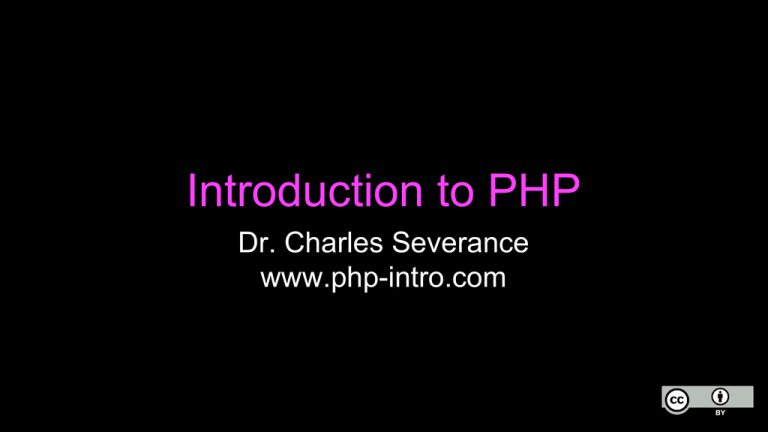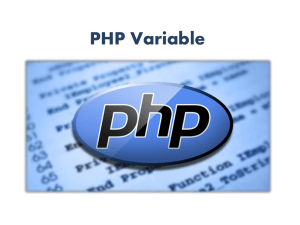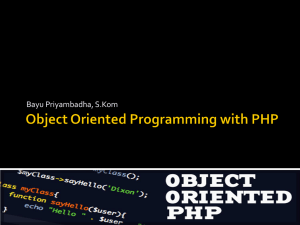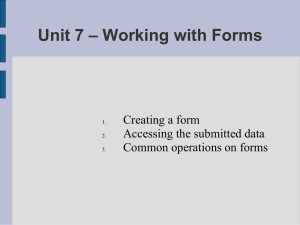PHP-03-Overview
advertisement

Introduction to PHP
Dr. Charles Severance
www.php-intro.com
About the PHP Language
•
•
•
Syntax is inspired by C
•
Curly braces, semicolons, no signficant whitespace
Syntax inspired by perl
•
Dollar signs to start variable names, associative
arrays
Extends HTML to add segments of PHP within an
HTML file.
Philosphy of PHP
•
•
•
•
•
You are a responsible and intelligent programmer
You know what you want to do
Some flexibility in syntax is OK - style choices are OK
Lets make this as convienent as possible
Sometimes errors fail silently
<h1>Hello from Dr. Chuck's HTML Page</h1>
<p>
<?php
echo "Hi there.\n";
$answer = 6 * 7;
echo "The answer is $answer, what ";
echo "was the question again?\n";
?>
</p>
<p>Yes another paragraph.</p>
<h1>Hello from Dr. Chuck's HTML Page</h1>
<p>
<?php
echo "Hi there.\n";
$answer = 6 * 7;
echo "The answer is $answer, what ";
echo "was the question again?\n";
?>
</p>
<p>Yes another paragraph.</p>
PHP From the Command
Line
•
•
You can run PHP from the
command line - the output
simply comes out on the
terminal
It does not have to be part
of a request-response
cycle
<?php
echo("Hello World!");
echo("\n");
?>
Key Words
abstract and array() as break case catch
class clone const continue declare default
do else elseif end declare endfor endforeach
endif endswitch endwhile extends final for
foreach function global goto if implements
interface instanceof namespace new or
private protected public static switch $this
throw try use var while xor
http://php.net/manual/en/reserved.
php
Variable Names
•
•
Start with a dollar sign ($) followed by a letter or
underscore, followed by any number of letters,
numbers, or underscores
Case matters
$abc = 12;
$total = 0;
$largest_so_far = 0;
abc = 12;
$2php = 0;
$bad-punc = 0;
http://php.net/manual/en/language.variables.basi
cs.php
Variable Name Weirdness
•
Things that look like variables but are missing a dollar
sign can be confusing
$x = 2;
$y = x + 5;
print $y;
5
$x = 2;
y = $x + 5;
print $x;
Parse error
Expressions
•
•
Completely normal like other languages ( + - / * )
More agressive implicit type conversion
<?php
$x = "15" + 27;
echo($x);
echo("\n");
?>
42
Output
•
•
echo is a language construct can be treated like a function
with one parameter. Without
parenthesis, it accepts multiple
parameters.
print is a function - only one
parameter but parenthesis are
optional so it can look like a
language construct
<?php
$x = "15" + 27;
echo $x;
echo("\n");
echo $x, "\n";
print $x;
print "\n";
print($x);
print("\n");
?>
Conditional - if
•
•
Logical operators ( == != < > <= >= && || ! )
Curly braces
<?php
$ans = 42;
if ( $ans == 42 ) {
print "Hello world!\n";
} else {
print "Wrong answer\n";
}
?>
Hello World!
Whitespace does not matter
<?php
$ans = 42;
if ( $ans == 42 ) {
print "Hello world!\n";
} else {
print "Wrong answer\n";
}
?>
<?php $ans = 42; if ( $ans == 42 ) { print
"Hello world!\n"; } else { print "Wrong answer\n"; }
?>
What Style do You Prefer?
<?php
$ans = 42;
if ( $ans == 42 ) {
print "Hello world!\n";
} else {
print "Wrong answer\n";
}
?>
Aesthetic
s
<?php
$ans = 42;
if ( $ans == 42 )
{
print "Hello world!\n";
}
else
{
print "Wrong answer\n";
}
?>
Associative Arrays
•
•
•
Like Python Dictonaries+Lists - but more powerful
Can be key => value or simply indexed by numbers
Ignore two-dimensional arrays for now...
Integer Indices
<?php
$stuff = array("Hi", "There");
echo $stuff[1], "\n";
?>
There
Integer Indices
<?php
$stuff = array();
$stuff[] = "Hello";
$stuff[] = "World";
echo $stuff[1], "\n";
?>
World
Integer Indices
<?php
$stuff = array();
$stuff[2] = "Hello";
$stuff[9] = "World";
echo $stuff[9], "\n";
?>
World
Key / Value
<?php
$stuff = array("name" => "Chuck",
"course" => "SI664");
echo $stuff["course"], "\n";
?>
SI664
Dumping an Array
•
The function print_r() dumps out PHP data - it is used
mostly for debugging
<?php
$stuff = array("name" => "Chuck",
"course" => "SI664");
print_r($stuff);
?>
Array
(
[name] => Chuck
[course] => SI664
)
Dumping an Array
•
The function print_r() dumps out PHP data - it is used
mostly for debugging
<?php
$stuff = array();
$stuff[2] = "Hello";
$stuff[9] = "World";
print_r($stuff);
?>
Array
(
[2] => Chuck
[9] => SI664
)
var_dump .vs. print_r
<?php
$stuff = array("name" => "Chuck",
"course" => "SI664");
var_dump($stuff);
?>
array(2) {
["name"]=>
string(5) "Chuck"
["course"]=>
string(5) "SI664"
}
http://stackoverflow.com/questions/3406171/php-var-dump-vsprint-r
var_dump() is more verbose
<?php
$thing = FALSE;
echo("One\n");
print_r($thing);
echo("Two\n");
var_dump($thing);
?>
One
Two
bool(false)
http://stackoverflow.com/questions/3406171/php-var-dump-vsprint-r
Looping Through an Array
<?php
$stuff = array("name" => "Chuck",
"course" => "SI664");
foreach($stuff as $k => $v ) {
echo "Key=",$k," Val=",$v,"\n";
}
?>
Key=name Val=Chuck
Key=course Val=SI664
Variable Name Weirdness
•
Things that look like variables but are missing a dollar
sign as an array index are unpredictable....
$x = 5;
$y = array("x" => "Hello");
print $y[x];
Hello
Strings
•
•
•
•
String literals can use single quotes or double quotes
The backslash (\) is used as an "escape" character
Strings can span multiple lines - the newline is part of
the string
In double-quoted strings variable values are expanded
http://php.net/manual/en/language.types.strin
g.php
<?php
echo 'this is a simple string';
Single
Quote
echo 'You can also have embedded newlines in
strings this way as it is
okay to do';
// Outputs: Arnold once said: "I'll be back"
echo 'Arnold once said: "I\'ll be back"';
// Outputs: This will not expand: \n a newline
echo 'This will not expand: \n a newline';
// Outputs: Variables do not $expand $either
echo 'Variables do not $expand $either';
?>
<?php
echo "this is a simple string\n";
echo "You can also have embedded newlines in
strings this way as it is
okay to do";
// Outputs: This will expand:
//
a newline
echo "This will expand: \na newline";
// Outputs: Variables do 12
$expand = 12;
echo "Variables do $expand\n";
?>
Double
Quote
<?php
echo 'This is a test'; // This is a c++ style comment
/* This is a multi line comment
yet another line of comment */
echo 'This is yet another test';
echo 'One Final Test'; # This is a shell-style comment
?>
http://php.net/manual/en/language.basicsyntax.comments.php
Summary
•
This is a sprint through the language features of PHP
Acknowledgements / Contributions
These slides are Copyright 2010- Charles R. Severance
(www.dr-chuck.com) as part of www.php-intro.com and made
available under a Creative Commons Attribution 4.0 License.
Please maintain this last slide in all copies of the document to
comply with the attribution requirements of the license. If you
make a change, feel free to add your name and organization
to the list of contributors on this page as you republish the
materials.
Initial Development: Charles Severance, University of
Michigan School of Information
Insert new Contributors and Translators here including names
and dates
Continue new Contributors and Translators here





